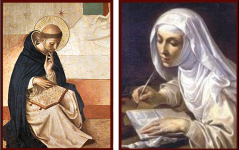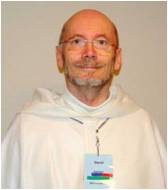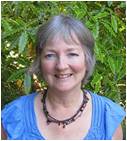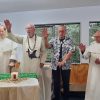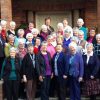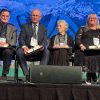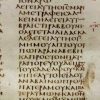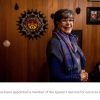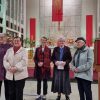 DOMINICAN LAITY
DOMINICAN LAITY
Newsletter #21
March 2012
Dear Friends
2012 promises to be a big year for Dominicans in New Zealand. In a few days many of us will gather to celebrate a reunion of ex-pupils of Teschmakers. What a weekend that will be! Coming so soon after St Patrick’s day, it reminds us of an Irish blessing:
May God grant you many years to live,For sure He must be knowingThe earth has angels all too fewAnd Heaven is overflowing.
……………………………………………………………………………………………………………..
LET’S NOT TALK ABOUT ORGANISATION!
This newsletter has been going for 4 years now. In 2010, 20 lay Dominicans gathered in Wellington to think about the future. There was deep commitment and love for the Dominican vision, but somehow no real organisation emerged from the gathering (probably a reflection of the beginnings of the Order, and the way St Dominic worked). But recently it has become clear that we really do need to have some kind of group that can provide some discussion of mattes that arise.
A very few of the original steering group decided to reform as a consultative group, with some more people added. That consultative group (called Domconsult) is now up and running. Its members are: Colleen Hopwood (Invercargill), Katie O’Connor (Gore), Moira Gallagher (Dunedin), Norman Gray (Queenstown), Mike Kelly and Jenny Wilson (Masterton), Mary Johnson (Deaf community, Auckland) Susan Healy (Auckland). Teresa McNamara (Auckland). There is no chairperson, but different people initiate discussion at different times. And it is intended that whenever a topic comes up for discussion, it will be detailed in this newsletter, and your comments will be taken into consideration NO! they will be given the highest value!
The people in the group are very keen to hear from you. They see themselves very much as an interim group, and will welcome offers from you to participate in any way you feel able – being willing to meet occasionally, sharing ideas, being on the Domconsult group, praying……
At some time in the near future you will be invited to respond to a series of questions about the lay Dominican movement in New Zealand. Watch this space!
………………………………………………………………………………………………………….
AND THE FIRST TOPIC IS…
The sisters have put forward a proposal.
Background: for some years the Dominican sisters have had a Mission and Formation Committee. More recently, they opened that up to include friars and lay people. It has been a valuable means of discernment of the world around us from a Dominican perspective, and incidentally of bringing the branches of the Dominican family together. The sisters have generously funded nearly all that the committee did.
The new proposal is for an independent committee, consisting of two representatives of each of the three branches of the family. Its precise functions and dynamics – even its name – will be worked out by the committee itself, but it would certainly be a means a building up the Dominican family, growing the relationships, furthering the Dominican mission in New Zealand, finding new ways of holding up the torch to shine on our Church and our country.
The consultative group (see above!) believe it is an excellent idea and the sisters will be informed of our support and thanked for their initiative.
Without doubt, once the group gets under say there will be many issues that need to be explored by all of us who belong to the Dominican family. For the present, in order to get the committee under way, we need to think about who will represent the laity.
The Domconsult group feels it would be wise for there to be one rep from the South and one from the North Island. So the task now is to find those reps. It is not easy to take this step, not knowing just how the committee will operate (meeting face to face? teleconference? email? snail mail?) These things need to be worked out. And they will be worked out with the reps from the sisters and the friars.
But if you have any thoughts about who, and how, and what, in relationship to this committee, PLEASE email or phone one of the Domconsult people. Maybe you could take on the committee role?
…………………………………………………………………………………………………………..
Teresa McNamara was the lay participant for New Zealand at the Asia-Pacific Dominican Family Leaders Conference in Vietnam. Her report follows:
Text to God | What Should I Do?
Attending the Dominican Family Leaders Conference in Vietnam has been a wonderful opportunity to take a peek into Dominican laity around the Asia Pacific region. I returned to Aotearoa New Zealand feeling very blessed to have the lifestyle I do and very grateful for the opportunity to see and experience Dominican life in another country.
Vietnam is a country where religion isn’t easy. Just to offer a parish catechesis programme for children the Dominican Sisters must get written permission from the Government. The Dominican family in Vietnam is strong, with 340 Friars, over 1000 Dominican Sisters in six congregations, over 100,000 professed laity and many more laity who have not taken vows of profession.
We were gathered in Saigon (Ho Chi Minh City) from 5-12 February, 86 delegates from 13 countries coming together to discuss and exchange our views as Dominicans and specifically looking at the theme “Challenges of Mission in Asia Pacific Today”.
The keynote address by Fr Edgar Javier, SVD encouraged us to respond to the challenges without forcing change on others. Often in the past, missionaries have forced people to let go of their own ways. Missionaries today must embrace the culture of others and minister within this.
Megatrends today include migration, urbanisation and mediatisation. Whilst globalisation has destroyed many boundaries it has also built new boundaries and these are the challenges we must respond to today. There are now boundaries between locals and migrants, between the literate and illiterate, those who make decisions and those who live with decisions, those who are rich and those who are poor. We were asked to think about when we last met a hungry Bishop!
Fr Edgar defined being a missionary today as crossing the border and entering into the world of another. To be Christ-like we must think, feel and act like Christ. As missionaries we must be lovers of other people, other cultures and other religions and spiritualities.
Fr Edgar gifted us five images to take away of the missionary of today. They are to be a:
Listener: take time to listen to the voice of others – learn from those who are different to you.
Bridge-builders: reach out the hand of friendship to those of other cultures and religions.
Healer/Reconciler: past actions mean we have much to seek forgiveness for. Let us be humble.
Household of God Builder: Earth is God’s household. We must each be the one who cares for earth and our environment.
Person of Silence: we are called to be mystics and prophets. Make time for contemplation.
In a regional discussion of delegates from Australia, Solomon Islands and New Zealand key issues included:
Migration: particularly boat people arriving in Australia.
New Evangelisation in a secular society.
Global warming and our mission to care for the Earth.
One sentence that keeps going through my mind is “you don’t need lots of stamps in your passport to be a missionary today”. What challenges are there for you as a missionary in your community today? For whom do you bring opportunity or hope? What response would you receive if you were to text God saying “What should I do?”
One of the benefits of attending a conference like this is that you meet others from the global Dominican family. One of the many people who inspired me was Fr David Kammler OP, Promoter of Dominican Laity. He used the image of the Tree of Dominic to illustrate the value of laity in the Dominican Family. From a big branch small twigs emerge and slowly they grow into a strong branch. There are many leaves (members) in the Dominican laity worldwide. Their gifts flower and give fruit in many unique ways. Concurrently dry leaves are falling from the tree, creating compost that will nourish new life. (Note: in a later newsletter we shall consider a possible visit by Fr David to New Zealand. Ed.)
Our hosts from Vietnam were very hospitable and went out of their way to ensure that our stay was enjoyable. There were many opportunities to share different cultural experiences; through the preparation of the liturgy and a number of cultural concerts. The highlight of these must be the Dominican Family Day celebrated at the Generalate of the Sisters of St Rose of Lima. Performers creatively shared the deep faith of the Vietnamese people.
Without doubt the highlights of this experience for me were our first and last days in Vietnam. Helen Bergin and I arrived into Saigon the day before the Conference started thinking we would catch up on sleep and overcome any jetlag we might have. We stayed with the Dominican Congregation of Our Lady of the Rosary where we were up in time for 5am Mass with the Sisters (Helen made it to 4.30am morning prayer too). After breakfast and time to look around their Mother House we visited the Sisters’ kindergarten and boarding house. As we walked around the boarding house I was struck by the simplicity of their life. For each child, just one set of spare clothes and one numbered towel. All of the clothes owned by the four sisters at the boarding house hung on one small rack. I felt guilty when I thought about how many clothes I have in my wardrobe – many of which never get worn!
On our last day in Vietnam we were hosted by the Dominican Sisters of Tam Hiep. This beautiful group of women really put their faith into practice supporting and loving people on the edges. One of their ministries is to elderly homeless women. These women have typically lived on the streets for many years. They are women with no family to support them. Many times they get sick with what we would regard as a minor illness that for them becomes life-threatening. Sometimes the women will collapse on the street and some kind person will pick them up and drop them off at the gates of the Sisters Home. The Sisters take the women in, give them medicine to make them well and provide a home and all that they need from that time on. They started this home eighteen years ago but only received Government permission last year. They have turned swampy waste ground that nobody else wanted into what I would describe as a “mini-Venice” – with pretty lakes, bridges and pagodas. They accommodate around sixty women, mainly in their seventies or older at any one time however they make exceptions when the need arises. I was particularly touched by Ohmn, a woman in her mid thirties. As a result of a motor vehicle accident eleven years ago she is paralysed from the waist down. Although she has a husband and two teenage sons Ohmn lives with the Sisters as it is too hard for family to look after her. Ohmn spends her days on a metal bed – that way she doesn’t need to be moved – she eats, sleeps and is washed on that bed. So sad and yet Ohmn would say she is lucky as she has such a nice place to stay and the Sisters look after her so well. A wonderful reminder of the blessed lives most of us live in Aotearoa New Zealand.
As I conclude this report I recall the words of the Cardinal of Saigon. He spoke of the difficulties when Vietnam was closed to the world and how he saw our presence in Saigon as a sign of the presence of the Holy Spirit – a signal of opportunity and hope for the future. This Conference was a call to mission – for whom do YOU bring opportunity and hope?
This experience has been a real blessing for me. I give thanks to the Dominican Sisters for giving me the opportunity to represent New Zealand at this meeting and I give thanks to the Dominican Laity for supporting that invitation and encouraging me to attend.
Teresa McNamara
……………………………………………………………………………………………………..
Lay Dominicans are involved in so many different areas of Church and society. One who has done more than her share is Mary Betz. Susan Healy interviewed her.
Mary Betz, member of our Dominican family
Introduction by Susan Healy
Recently I attended a meeting of the Auckland Diocesan Justice and Peace Commission, where Mary Betz was present as the staff support person. I heard a lot of appreciation for the work Mary had done in helping the work of the different committees and could see how effective she had been. I couldn’t help feeling proud of Mary as a member of our Dominican family. Here are her answers to an email interview with her.
Q. Can you tell me briefly about the establishment of a new JP commission for Auckland diocese?
A. The new Auckland Diocesan Justice and Peace Commission was set up in 2009 by Bishop Pat Dunn. There is a long history of justice commissions and staff in the diocese, and this is the most recent initiative to try to encourage in Catholic parishioners an understanding of doing justice as integral to their faith. We hope to increase the awareness and understanding of Catholic social teaching and its application to justice issues faced within the Auckland diocese, nationally and internationally.
To find out more about the Commission and its work go to www.catholicjusticeauckland.org.nz
Q. What has your work for the Commission involved?
A. The Commission has a chairperson, Peter Garrick, and I am the staff support person. I resource the Commission, committees and parish animators by keeping aware of justice issues and forwarding information to the appropriate persons/ committees. I help keep the committees on track; often prepare scripture reflection and Catholic social teaching for Commission and Committee members; do the networking with Caritas, Pax Christi and other justice, NGO and government organisations; recruit committee members and animators; suggest guest speakers; suggest possible ways of involving parishes; and generally keep things running as smoothly as possible. This is a sometimes full time job which is theoretically only half time (The other half of my time is spent in the pastoral office of the diocese working with parish pastoral councils and the Diocesan Pastoral Council, etc.)
Q. What is your background in justice and peace issues?
A. I came to social justice through my commitment to environmental justice and a few key justice people in my parish in Vancouver. I worked for a number of years (late 70s/early 80s) doing environmental impact assessments of major hydro-electric and transmission line projects in British Columbia, and part of the assessment was of the effects on local communities. At the same time I became involved with a social justice group at my parish, learned social analysis and Catholic social teaching, helped run immersions in the Vancouver inner city, became a rep for CCODP (the Canadian equivalent of Caritas) and was also involved with a group called Project North which helped make Euro-Canadians aware of the situation of indigenous Canadians. When my environmental job ended in a recession, I decided to study theology, which I did in an interdenominational context at the Vancouver School of Theology.
When I came to New Zealand in the late 80s, I was mostly busy with two young children, helping with music, liturgy and sacramental programmes. I was also reading widely in feminist theology, and eventually studied toward a PhD, focussing on women’s understandings of God. This was both a spirituality and a justice issue for me, for our God-language/images and even people language are often masculinised within church liturgy and teaching. As my children got older, I worked as a tertiary chaplain and a faith education coordinator, and in both positions easily integrated concerns for justice into my work with others. More recently I worked with Caritas and now with the Auckland diocese, which has given me a more focussed concern with spreading justice awareness among Catholics.
Q. How long have you had links with the Dominican family and how do you see your work fitting with the Dominican mission?
A. My year 1 teacher in a small town in Illinois was a Dominican sister – but I don’t think that really counts, except that when my little brother who was 3 at the time first came to a school mass, he looked at Sister Marie Emily and said, ‘Look, mom, there’s God!’ My first real connections came when I moved to Dunedin from Vancouver in 1988. After a Sunday at one parish, I felt like I had gone back to the 1950s, and after asking around, found out there was a Dominican parish in Northeast Valley. Paul Rankin was filling in for Kevin Toomey when we first arrived. We were met immediately before and after mass by the lay leader of the parish, Peter Paardekooper, who in about 5 minutes had me signed up to lead a Lenten programme and to sing and play with the music group. My guitar hadn’t arrived from overseas yet, but he arranged a loan of one from Sandra Winton, brought to me by Jan Ogilvy, who played flute with the group. So began a life-long friendship with both Dominican women and men in NZ. Kevin soon took me out to Holy Cross seminary where I met Helen Bergin and Bernie Cheyne. I helped organise the yearly parish retreats at Teschemakers, so met Judith Anne O’Sullivan, Mary Anna Baird, Susan Healy and many others. Every couple of years the Dominican sisters had a summer school which brought religious and lay women together from all over the country to learn scripture, theology and create liturgy – so wonderful. Jan in particular was always a part of family birthdays, and I was often invited to the sisters’ celebrations. Helen babysat my daughter while I was tutoring, and later even put me up at her residence when I visited Washington DC while she was doing her PhD. I was on the Catholic-Presbyterian Dialogue and got to know Susie Logan, and this friendship continued when we both moved to Palmerston North, where she lived first with Judith Anne and Gemma Findlay, and then Maureen O’Hanlon. Now in Auckland, I have worked at CIT with Helen and on the Justice and Peace Commission with Bernie, and continue to meet the Auckland Dominicans at St Ben’s worship or other events.
It was in Palmerston North that Judith Anne, Susie and Gemma invited some of us lay women to break open the Scriptures regularly with them. There were a number of women that came over the years, but there was also a special group which came to be known as the 3 Dominicans and 3 Marys, and all of us were living out, in some way, commitments to scripture/prayer, study, justice and community (in which food always played a part!). Susie often stayed with my daughters when I had work commitments in the evenings, and I often dropped in for a cuppa when work permitted. They have been a very core part of the formation of who I am, and have given me so much love and support, and I hope that in some way I pass that spirit of friendship and working together on to my children and those I work with. Oh, and one of my husband’s middle names is ‘Dominic’!
……………………………………………………………………………………………………………………………………………..
OBITUARY: SISTER MARY CONCANNONOP
Died 24 January 2012
Mary Concannon OP was through and through a Southlander and through and through a Dominican. With these two passions enriching her Mary lived her life influencing many people from diverse backgrounds. Mary’s parents, Michael and Mary and her sister Denise gave Mary a rich and stable background in Woodlands, Southland. After attending St. Catherine’s College in Invercargill for all her schooling Mary entered the Dominican sisters where she was known for several years as Sister Mary Michael. Mary’s ex-pupils will remember her by this name. Most of us are more familiar with her baptismal name.
Mary was a significant teacher and an effective principal. She was known for her enthusiasm, skills in teaching, her fairness in her relationships with staff and pupils and her enduring interest in ex-pupils and colleagues. Many years after she left school teaching Mary retained her interest through her membership on the Board of Trustees of Kavanagh College, Dunedin.
After the second Vatican Council Mary, along with Sr Mary Horn, had the opportunity to study overseas, where she absorbed the insights of the Council and became fascinated by Adult Education and later by Spiritual Direction. Mary contributed to the development of the Teschemakers Retreat and Conference Centre and the Palmerston North Pastoral Centre. For many years Mary was involved with Spiritual Growth Ministries, an ecumenical movement, backed by the Presbyterian Church. Mary co-wrote a training programme for Spiritual Directors which has been the main source of many spiritual directors in this country. She also facilitated many of their training days. Through all these ventures Mary made indelible marks on people of many faiths and walks of life. Wherever there are people searching in faith you will find people who were touched by Mary’s enthusiasm for the Gospel.
Mary’s life involved a lot of travelling around this country, beyond the usual places where we Dominicans ministered and in a much more ecumenical situation than most of us knew in the eighties and nineties. She was enriched by this and enriched us through these experiences.
Mary was a passionate Dominican and was always keen to pass on the Dominican charism through vowed life and the wider Dominican family. The decline in the number of Sisters caused her great sorrow and she struggled with this phenomenon until her death.
For many years Mary worked with very indifferent health. Finally she needed and obtained a liver transplant but, unfortunately, she suffered a severe stroke in 2003. This meant that she lived these last eight years and more at Sacred Hospital, Brockville, Dunedin, in the care of the Little Sisters of the Poor and their staff. Throughout all these years Mary stayed interested in her ecumenical work, education and Dominican life. As recently as October 2011 she attended a meeting of the Catholic-Presbyterian dialogue, an interest of hers for many years.
Those of you who have known people who live with the results of a stroke will appreciate that these last years called Mary in a particular way into the mystery of life and the mystery of suffering. This life is not always pretty. Mary, her carers, Sisters, friends and family learned much over these years. We Sisters will always be grateful for the care Mary received at Brockville.
Over the last few months Mary knew she was on her last journey. She was full of gratitude and often referred to her motto ‘God is good’.
We thank God for the gift of Mary, and pray that she will be with her ‘Good God’.
Margaret Butler OP
………………………………………………………………………………………….
Have you read the latest TuiMotu? A born-and-bred Dominican venture. The March edition features articles by Sisters Cecily Sheehy (on Lent) and Mary Horn (on two artists’ portrayal of Christ), comment on the sale of state assets, the value of Catholic schools- and the “Mother’s Journal” of the wonderful Kaaren Mathias. TuiMotu needs new subscribers, and people who can promote it in parishes. It also welcomes new writers. Could that be you?
A Lenten blessingWhen your soul whispers of its deepest longings, may you quiet yourself to listen.May you follow the path of yearning to the One alone who blends the uneven edgesinto a life of meaning.May you meet and be united with Godand give thanks for the whispersthat led you there.
Mike Kelly and Jenny Wilson
Co-ordinators
Ph 06 370 2084 Email: kelly-wilson@ihug.co.nz
